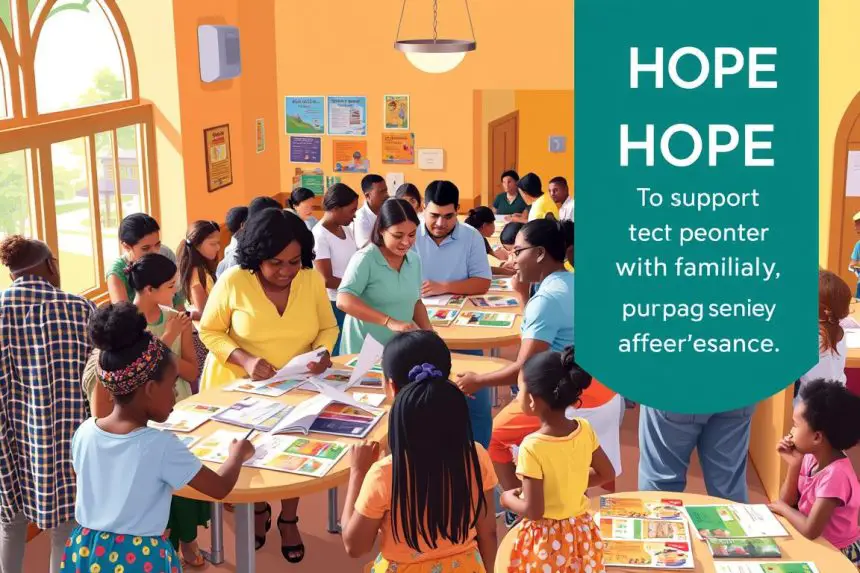Did you know about 12% of Illinois homes live in poverty? Financial hardship is a tough reality for many, often faced in silence. Yet, using available aid can greatly help. Illinois has many programs to help families in need. These include healthcare, childcare help, and direct cash support, often called “charity care.”
The Illinois Department of Human Services (IDHS) and various nonprofits offer these family aid programs. They aim to provide needed help during tough times. They help with important needs like food and healthcare, and also help families get back on their feet financially.
There’s also special help for pregnant and single moms, like the Healthy Start and Moms & Babies programs. Plus, family programs like FamilyCare and All Kids help avoid big medical bills. Getting help from these sources is a big step toward securing a better future for your family.
Key Takeaways:
- Almost 12% of households in Illinois experience poverty.
- Illinois offers diverse family assistance programs through IDHS and nonprofits.
- Programs like FamilyCare and All Kids provide essential healthcare coverage.
- Specialized support for pregnant and single mothers is available through Healthy Start and Moms & Babies.
- Seeking and utilizing these support services for families is crucial for navigating economic challenges.
Government Assistance Programs for Families
Illinois offers many government assistance opportunities for families who are struggling. These programs help improve life and well-being by guiding toward self-sufficiency and financial stability for families.
Temporary Assistance for Needy Families (TANF)
The Temporary Assistance for Needy Families (TANF) program gives temporary financial help. It supports families towards self-reliance. About 2.5 million people got help from TANF in 2017. A typical family of three got about $447 every month.
TANF rules include Family Assistance (FA) terms. These set a 60-month limit on getting benefits. They also require work from able adults. This helps guide families to financial steadiness.
Supplemental Nutrition Assistance Program (SNAP)
The Supplemental Nutrition Assistance Program (SNAP) makes sure low-income families get needed nutrition. It serves 47.6 million people or 23 million households. Families get about $133 per person each month. This crucial aid helps secure healthy food, improving health and well-being.
Women, Infants, and Children (WIC)
The Special Supplemental Nutrition Program for Women, Infants, and Children (WIC) focuses on the needy. It supports low-income pregnant women, new moms, and young kids. In 2017, WIC helped 7.7 million people. It provides food help, nutrition teaching, and aid.
This enhances diet and health for those at risk.
Medicaid and CHIP
Medicaid and the Children’s Health Insurance Program (CHIP) make healthcare reachable for low-income families. Medicaid helps one in five Americans, aiding over 76 million people in 2016. CHIP assists six million uninsured kids under 19 whose families earn too much for Medicaid but qualify for CHIP.
Together, these programs ease health-related financial worries. They support long-term health and financial wellness.
The government assistance opportunities mentioned, like TANF, SNAP, WIC, Medicaid, and CHIP, cater to low-income families. They provide necessary resources and back overall financial stability for families. By using these programs, families can overcome economic hurdles and better their lives.
| Program | Recipients | Average Benefit / Coverage |
|---|---|---|
| TANF | 2.5 million (2017) | $447/month for a 3-person family |
| SNAP | 47.6 million / 23 million households | $133/month per person |
| WIC | 7.7 million (2017) | Varies by need |
| Medicaid | 76 million (2016) | 1 in 5 Americans |
| CHIP | 6 million children | Insurance coverage up to age 19 |
Community-Based Support Services
Empowerment starts with being part of a community. In the USA, there are many networks that help families. They provide strong resources to make families financially strong.
Food Banks and Emergency Aid Funds
Food banks are key for families, offering food to those who need it. They offer emergency aid too. Feeding America is a big name here, working with over 200 food banks to help families.

Human Services Programs
Human services programs offer wide-ranging support. They help with housing, healthcare, and jobs. The Department of Human Services (DHS) makes these resources easy to get.
Non-Profit Organizations
Non-profits play a big role in community support. United Way and Catholic Charities offer help like food and clothing, and also long-term support. They provide counseling, legal help, and job training.
Red Cross Hero Care Center
The Red Cross Hero Care Center focuses on military families. They offer financial help and counseling, especially during emergencies. Their work helps strengthen the finances of military families.
| Service Provider | Type of Support | Target Beneficiaries |
|---|---|---|
| Feeding America | Food Banks, Emergency Aid | Families facing food insecurity |
| Department of Human Services (DHS) | Housing Assistance, Healthcare, Employment Support | General public |
| United Way | Food, Clothing, Counseling, Legal Aid | Low-income families |
| Red Cross Hero Care Center | Emergency Financial Support, Counseling | Military families |
Conclusion
In times of fiscal stress, understanding and utilizing available support is crucial. Families facing financial hardship have many resources. State-run assistance programs, community, and non-profit support networks are there to help. Programs like Temporary Assistance for Needy Families (TANF) and Supplemental Nutrition Assistance Program (SNAP) are key. They provide healthcare, food, and emergency aid, helping families cope with financial difficulties.
Statistical data highlights the importance of these services. For instance, enhancing SNAP by promoting work and job training can lower reliance on assistance. Also, financial incentives for healthier food choices could improve family well-being. Community-based programs and non-profits, like PACER Center, support these improvements. They create a safety net that guides families toward stability and resilience.
Research shows the benefits of family support programs. The Nutrition Detectives™ program teaches healthy food choices, aiding in financial challenge overcoming. Addressing hunger through USDA recommendations or improving programs for vulnerable families helps. These efforts make a comprehensive approach to assist those in need. Seeking help shows strength; finding the right resources is a step to recovery and prosperity. Discussing financial well-being and leveraging community support are keys to success.
FAQ
What types of family assistance programs are available in Illinois?
Illinois has many programs to help families. These include TANF, SNAP, WIC, and Medicaid/CHIP. They offer a wide range of supports like financial aid, healthcare, and childcare assistance.
How can families access financial aid and support services in Illinois?
Families in Illinois can get help through the IDHS. They can also reach out to many non-profits. These groups help with food, healthcare, and money needs.
What is Temporary Assistance for Needy Families (TANF) and how can it help?
TANF gives short-term money help to eligible families. It aims to help them stand on their own. The program includes cash aid and help with jobs to ensure long-term stability.
How does the Supplemental Nutrition Assistance Program (SNAP) benefit low-income families?
SNAP helps by giving money for healthy food. This improves low-income families’ health and well-being. It helps them have access to good food for a balanced diet.
What support does the Women, Infants, and Children (WIC) program offer?
WIC aids pregnant women, new moms, and young kids. It provides healthy food, health tips, and doctor referrals. This help is key for their health and growth.
How do Medicaid and CHIP programs support families in Illinois?
Medicaid and CHIP provide health coverage for low-income families. They have special programs for kids and pregnant women. This lessens the cost of medical care for families.
What community resources are available for families in need?
Illinois has many community resources like food banks and emergency funds. There are also human services and non-profit groups. They offer shelter, counseling, and legal advice. These supports are key for family well-being and financial health.
How can food banks and emergency aid funds help families?
Food banks and emergency funds help families in tough times. They provide food and short-term money help. This ensures families have what they need.
What role do non-profit organizations play in supporting families?
Non-profit organizations in Illinois help families in many ways. They provide shelter, counseling, and money advice. They help with both urgent and long-term needs, supporting family health and stability.
How does the Red Cross Hero Care Center assist military families?
The Red Cross Hero Care Center offers emergency money help to military families. This help is crucial during crises. It ensures these families have what they need.




